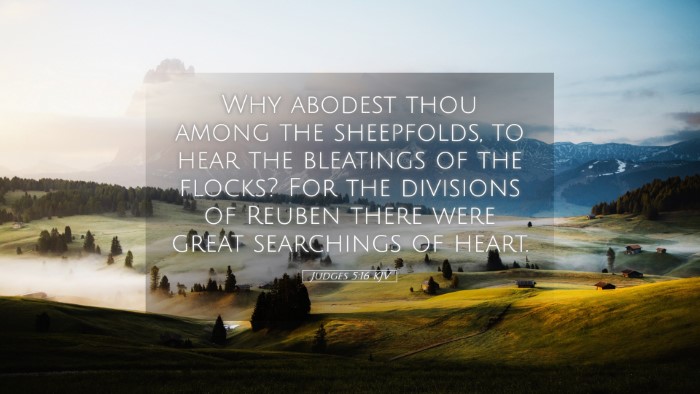Bible Commentary on Judges 5:16
Judges 5:16 states: "Why abodes thou among the sheepfolds, to hear the bleatings of the flocks? For the divisions of Reuben there were great thoughts of heart."
Context and Background
This verse comes from the Song of Deborah, where Deborah and Barak celebrate Israel's victory over the Canaanites. It reflects on the tribes of Israel and their varied responses to the call to arms. The critique of Reuben’s inaction in this verse provides insight into the broader themes of unity, courage, and commitment in the face of national crisis.
Insights from Commentaries
Matthew Henry's Commentary
Matthew Henry emphasizes that Reuben, despite having noble thoughts and intentions, failed to act. He highlights the importance of action in maintaining faith:
- Thoughts vs. Actions: Henry points out that Reuben was pondering the situation ("great thoughts of heart") but did not translate these thoughts into action. This reflects a common human failing where intentions do not materialize into deeds.
- Divided Allegiances: The mention of “divisions” symbolizes a lack of unity among the tribes, showing how internal divisions can prevent a collective response during times of need.
- The Sheepfolds: By dwelling among the sheepfolds, Reuben showed an attachment to comfort and security, neglecting the call of duty, which was seen as shameful.
Albert Barnes' Notes
Albert Barnes elaborates on the significance of Reuben's inactivity:
- Exploration of Sheepfolds: Barnes draws attention to the metaphor of "sheepfolds," suggesting that the tribe was more concerned with tending to their flocks than responding to the call for military aid. This emphasizes a retreat into comfort when faced with potential danger.
- Evaluation of Response: He critiques their indecision and cowardice, suggesting that true leadership requires immediate response to danger instead of dwelling on safety and comfort.
- Call for Reflection: Barnes encourages us to reflect on our priorities. Are we indulging in complacency while ignoring pressing duties?
Adam Clarke's Commentary
Adam Clarke provides a historical lens to understand Reuben’s behavior:
- Historical Context: Clarke gives a vivid description of the geographical position of Reuben, noting that their territory was likely bordering more peaceful regions which may have led to their complacency.
- Moral Responsibility: Clarke emphasizes that every tribe had a moral obligation to assist when called upon, and Reuben's reluctance symbolizes broader moral and social implications of neglecting responsibility.
- Encouragement to Action: He urges a reconsideration of loyalty, positing that true loyalty propels individuals to act in ways that benefit the community rather than isolating security.
Theological Implications
This verse ignites critical theological discussions regarding:
- Responsibility of Believers: The inaction of Reuben shows that pious thoughts without corresponding action are insufficient. Believers are called to respond actively to God’s commands.
- Unity and Division in the Body of Christ: Reuben’s division serves as a warning about the impact of internal disunity on a collective mission, akin to the challenges faced by the church today.
- Assessing Priorities: This passage encourages all believers to evaluate their focus — are they pursuing comfort or responding to God’s call? It raises questions about our commitments and where our efforts truly lie.
Conclusion
Judges 5:16 serves as a poignant reminder of the necessity for Christians to translate good intentions into actionable faith. The critique of Reuben's inaction resonates throughout history, as it instructs modern believers to prioritize collective responsibility and unity, ensuring that they do not retreat into their own comforts while neglecting the communal call of God. Reflective introspection can guide believers to be more attuned to their duty and the welfare of the community.


